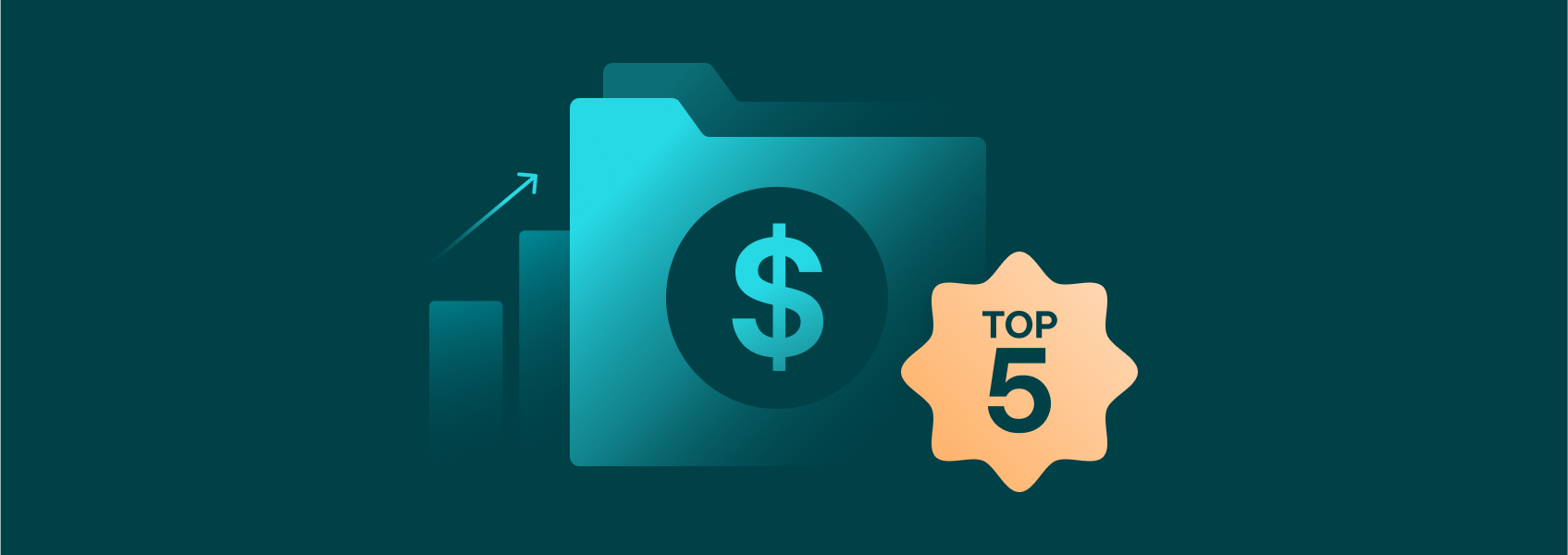Top 5 Financial Data Providers of 2026: A Quick Overview
News

Karolis Toleikis
Financial data can offer valuable insights, but accessing it can be difficult, particularly when considering compliance, risk management, availability, and more. That’s where financial data providers come in.
These companies collect, aggregate, and distribute stock prices, economic indicators, market trends, and company details to improve decision-making, strategic planning, and business growth. In this article, we’ll review our top 5 financial data providers you could look into for your business needs.
Why Choose a Financial Data Provider?
Many companies and individuals turn to manual data extraction tools and perform tasks like web scraping to access financial data . However, despite the convenience and control, in-house solutions can have a downside, especially when working with large projects.
In contrast, a reputable financial data provider can offer performance, efficiency, security, and results to make it easier for you or your business to make smarter, faster decisions in investing, trading, fintech development, or financial analysis.
Compared to the time-consuming process of collecting data from scattered or unreliable sources, providers can deliver clean, ready-to-use datasets through APIs, dashboards, or direct downloads.
This ultimately can save time and even money, as working with a trusted financial data provider can lead to consistently better results.
How to Choose the Right Financial Data Provider
When it comes to choosing the right service provider for virtually anything, there should be clearly defined criteria to help you choose the best service for your needs. This is especially true for financial data providers.
However, with so many options available in 2026, it can be challenging. First and foremost, it’s essential to lay down your specific business needs. Here are some key factors to consider:
- Data accuracy & reliability
High-quality data is a must, and to confirm this, you can look into a history of minimal downtime and reliable service-level agreements (SLAs).
- Coverage & depth
A good practice is to check whether or not a specific provider covers global markets, asset classes, and historical data archives.
- Performance
Quality data is one thing, but having access to it in real time is just as important.
- Integration & API support
Look for providers that offer flexible integration options like REST, APIs, SDKs, and plug-ins for popular platforms.
- Customization
While not necessarily essential, having the ability to use built-in tools for data visualization, analytics, or machine learning support can be important.
- Compliance
Make sure the provider complies with privacy and data harvesting laws, and licensing regulations in your region to avoid potentially costly legal risks.
The 5 Best Financial Data Providers of 2025
Whether you’re looking for the best data providers or just want to familiarize yourself with the market to gain financial information like cryptocurrency data or market prices to make better investment decisions, in this section, we’ll go over our top 5 best financial data providers.
1. Kaiko
Kaiko specializes in providing institutional-level blockchain and cryptocurrency data. This provider collects and distributes real-time and historical data across a wide range of digital assets and trading venues. Overall, Kaiko is a popular provider for institutional investors, exchanges, regulators, and fintech platforms who are looking to build data-driven products and run quantitative research.
- Data coverage: Derivatives, order books, trades, OHLCV, and DeFi metrics.
- Access: Via REST and WebSocket APIs, cloud data delivery (AWS, GCP), CSV exports, and partner integrations.
- Speed & reliability: Low-latency data streams with high uptime and scalable infrastructure.
- Pricing: Custom enterprise pricing.
- Compliance: Data governance, with transparent sourcing and adherence to regulations.
- Developer tools: Developer portal, detailed API documentation, sandbox environments, and client support for integrations.
- Why it made the list: Clean, reliable, and detailed crypto market data.
2. Exchange Data International (EDI)
Exchange Data International, or EDI for short, is another global financial data provider with a widespread reputation for servicing large institutions. The company offers high-quality financial data for banks, investment firms, and fintech companies. Additionally, EDI is recognized for its reliability and adherence to compliance by maintaining strict licensing standards.
- Data coverage: Global equities, fixed income, corporate actions, dividends, and reference data from 700 market sources.
- Access: Via FTP downloads, SFTP, APIs, and direct database access.
- Speed & reliability: Mostly end-of-day data, real-time data available for some feeds.
- Pricing: Custom pricing based on coverage and usage.
- Compliance: Fully licensed with data governance policies and compliant with international standards and exchange agreements.
- Developer tools: Great documentation, dedicated support teams, and integration services.
- Why it made the list: Authoritative global reference and corporate action data.
3. Bloomberg
Bloomberg is an established leader in financial data and analytics, offering comprehensive data through its flagship product, Bloomberg Terminal. This subscription-based service delivers real-time data, news feeds, unique insights, and advanced analytics to institutional investors and financial professionals, leveraging more than 100 billion data points.
- Data coverage: Equities, commodities, forex, fixed income, derivatives, ESG, and macroeconomic indicators.
- Access: Via Bloomberg Terminal, enterprise APIs (B-PIPE), Excel plug-ins, and data feeds.
- Speed & reliability: Ultra-low-latency real-time data with 24/7 support.
- Pricing: High-end pricing, typically subscription-based.
- Compliance: Data rights and compliance infrastructure covering global markets and legal jurisdictions.
- Developer tools: Advanced developer tools, onboarding services, and extensive documentation for API users.
- Why it made the list: Bloomberg is great for hedge funds, banks, and in-depth financial analysts.
4. Twelve Data
Finally, we have Twelve Data. It’s a financial data provider specializing in historical and real-time market data through a developer-friendly API, which supports analyzing stocks, forex, cryptocurrencies, and technical indicators. All in all, this company focuses on efficiency and simplicity, with hassle-free integration.
- Data coverage: Global equities, ETFs, forex, crypto, and fundamental data.
- Access: REST and WebSocket APIs with multiple language SDKs (Python, JavaScript, etc.).
- Speed & reliability: Real-time and historical data with fast and consistent response times.
- Pricing: Free tier with affordable monthly plans starting from $79/month.
- Compliance: Data is sourced and licensed through partnerships.
- Developer tools: Great documentation, sandbox environments, open-source SDKs, and community support.
- Why it made the list: Balance of price, performance, and developer experience.
5. Bright Data
Bright Data is a well-known leading data platform that provides the necessary services to enable businesses to collect structured, publicly available online data at scale. While Bright Data may not be a traditional financial data provider, the company is widely popular in the finance and fintech sectors, and it’s used to access alternative data.
- Data coverage: Alternative financial data from publicly available web sources, including e-commerce, market sentiment, and crypto pricing.
- Access: Web scraping tools, proxies, and APIs for automated data collection.
- Speed & reliability: Speed depends on your implementation, but the infrastructure is reported to have a 99.9% uptime.
- Pricing: Offers custom datasets with tailored pricing.
- Compliance: Focused on ethical scraping practices and GDPR-compliant data collection.
- Developer tools: SDKs, proxy managers, data collection templates, and documentation for developer teams.
- Why it made the list: Alternative or custom financial data with full control over sourcing.
Financial Data Provider Quick Comparison Table
| Provider | Key strength | Data focus | Access | Best for |
|---|---|---|---|---|
| Kaiko | Crypto market data | Cryptocurrency data | API, cloud, CSV | Institutional-grade crypto data |
| Bright Data | Alternative data at scale | Market sentiment, crypto, pricing | APIs, scraping tools | Custom/alternative financial data sourcing |
| EDI | Regulated, institutional-grade data | Global equities, corporate actions | FTP, APIs, DB access | Banks, fintechs in need of authoritative data |
| Bloomberg | Premium, real-time analytics | All asset classes, macroeconomic data | Terminal, APIs, Excel | Institutional investors & analysts |
| Twelve Data | Affordable, dev-friendly platform | Stocks, forex, crypto, indicators | REST/WebSocket APIs | Startups & developers needing market data |
Summing Up
The demand for real-time, accurate financial data will only increase, particularly with the widespread adoption of decentralized finance and digital assets. To provide a more comprehensive understanding of financial data providers, we’ve included various providers with specific focuses on financial data, ranging from cryptocurrencies to stocks, forex, and assets as a whole. Each provider has its strengths, so choose the one that aligns best with your needs.
Remember, if you plan to make investment decisions using these sources, always consult with a financial professional first.
FAQ
Are financial data providers safe and compliant?
Most reputable financial data providers are safe to work with and operate in compliance with data privacy and financial regulations. Additionally, trusted service providers emphasize risk management and the acquisition of licensed financial information, which is typically communicated clearly on their websites.
What’s the difference between market data and financial data?
Market data refers to live or historical information on trading activity on financial markets, including stock prices, digital asset data, bid/ask quotes, trading volumes, market prices, and exchange feeds. Financial data, on the other hand, is a bit of a broader term used to describe market data and things like financial statements, economic indicators, credit ratings, and alternative data.
Can I use financial data for commercial purposes?
If all the compliance, licenses, and agreements are in place, then probably yes. Please note that most financial data providers have specific terms for commercial use, and this also depends on their services. To avoid legal issues, make sure to consult thoroughly with your financial data provider to determine what data can be used for commercial purposes.
